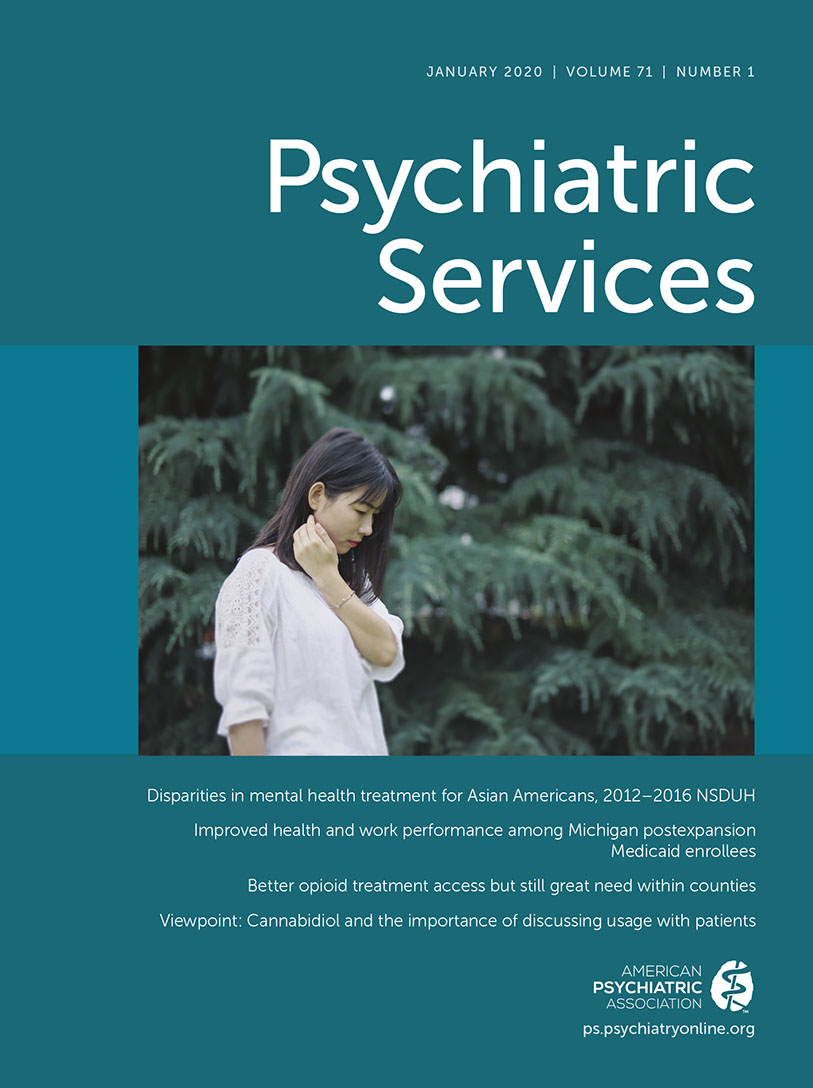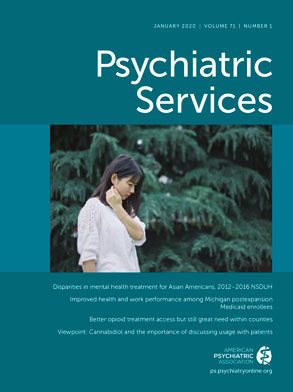Correlates of Patient-Centered Care Practices at U.S. Substance Use Disorder Clinics
Abstract
Objective:
Methods:
Results:
Conclusions:
HIGHLIGHTS
Methods
Dependent Variables
Explanatory Variables
Health care reform.
Organizational characteristics.
Leadership attributes.
Staff and client characteristics.
Control variables.
Analytic Approach
Results
Descriptive Statistics
| Patients invited to participate | ||||||||
|---|---|---|---|---|---|---|---|---|
| Yes (N=139) | No (N=454) | |||||||
| Variable | N | % | N | % | N | % | Fa | p |
| Dependent | ||||||||
| Invite patients to participate in clinical decision-making processes | 139 | 23 | ||||||
| Patient-centered care factor score (M±SD)b | –.1±.9 | .1±.9 | –.1±.9 | 6.5 | .011 | |||
| Explanatory and control | ||||||||
| Located in Medicaid expansion state | 472 | 70 | 102 | 70 | 325 | 69 | .1 | .783 |
| Total N of substance abuse admissions in county (thousands) (M±SD)c | 14.0±22.6 | 15.5±24.0 | 13.1±21.9 | 1.2 | .282 | |||
| Percentage of revenue from private and commercial insurance (M±SD) | 15.5±23.6 | 15.0±24.1 | 16.6±24.2 | .4 | .547 | |||
| Service modality | ||||||||
| Outpatient opioid treatment program | 213 | 8 | 45 | 9 | 155 | 9 | .0 | .946 |
| Outpatient nonopioid treatment program | 290 | 66 | 48 | 52 | 209 | 71 | 17.6 | <.001 |
| Inpatient clinic | 46 | 4 | 11 | 4 | 27 | 4 | .2 | .690 |
| Residential clinic | 108 | 21 | 35 | 35 | 63 | 17 | 22.4 | <.001 |
| Ownership | ||||||||
| Private for profit | 162 | 30 | 39 | 28 | 115 | 32 | .5 | .462 |
| Private nonprofit | 358 | 57 | 71 | 57 | 262 | 55 | 2.3 | .132 |
| Public | 90 | 13 | 21 | 15 | 66 | 13 | .3 | .619 |
| Owned by hospital or mental health facility | 152 | 25 | 31 | 24 | 109 | 23 | .0 | .834 |
| Accountable care organization or patient-centered medical home in place | 150 | 22 | 34 | 31 | 106 | 21 | 5.1 | .025 |
| Accredited (JC or CARF)d | 377 | 53 | 88 | 59 | 269 | 52 | 1.8 | .183 |
| Director perceived high competition | 372 | 60 | 78 | 61 | 260 | 57 | .6 | .448 |
| Directors’ reliance on professional information sources (M±SD)e | 3.4±.7 | 3.4±.7 | 3.4±.7 | .0 | .915 | |||
| Clinical supervisor endorsed 12-step treatment model | 328 | 56 | 76 | 60 | 246 | 53 | 1.9 | .172 |
| Percentage of staff with medical training (M.D. or R.N.) (M±SD) | 7.3±12.6 | 7.8±13.0 | 6.6±12.2 | .9 | .354 | |||
| Percentage of staff in recovery from substance use disorder (M±SD) | 33.3±29.5 | 34.5±27.1 | 33.7±29.8 | .1 | .810 | |||
| Percentage of patients with alcohol use disorder (M±SD) | 49.7±26.8 | 44.6±29.3 | 51.4±26.1 | 6.0 | .014 | |||
| Percentage of patients with opioid use disorder (M±SD) | 32.7±32.4 | 31.7±28.5 | 33.0±33.1 | .2 | .679 | |||
| Percentage of patients with prescription opioid use disorder (M±SD) | 27.6±25.4 | 28.5±26.6 | 27.6±25.2 | .1 | .738 | |||
| Percentage of involuntary patients (M±SD) | 46.1±34.8 | 50.4±34.0 | 44.4±34.8 | 3.0 | .083 | |||
| Percentage of patients from racial-ethnic minority groups (M±SD) | 39.5±31.1 | 50.0±35.0 | 35.8±29.0 | 21.4 | <.001 | |||
| Region | ||||||||
| Northeast | 182 | 21 | 33 | 18 | 131 | 22 | .2 | .649 |
| Midwest | 159 | 23 | 36 | 26 | 106 | 23 | .6 | .422 |
| South | 176 | 29 | 37 | 26 | 120 | 30 | .1 | .814 |
| West | 140 | 27 | 33 | 30 | 97 | 25 | 1.2 | .271 |
| N of staff (full- and part-time) (M±SD) | 21.7±36.9 | 22.7±53.4 | 32.6±32.6 | .1 | .783 | |||
Regression Analysis
| Patients invited to participate in clinical decision-making processes | Patient-centered care factor score | |||||
|---|---|---|---|---|---|---|
| Variable | OR | 95% CI | p | Coef | 95% CI | p |
| Located in Medicaid expansion state (reference: not) | 1.43 | .78 to 2.62 | .245 | –.13 | –.34 to .08 | .230 |
| Total N of substance abuse admissions in countya | .93 | .79 to 1.08 | .333 | .01 | –.04 to .07 | .598 |
| Percentage of revenue from private and commercial insuranceb | .91 | .70 to 1.17 | .445 | .07 | –.01 to .16 | .082 |
| Service modality (reference: outpatient nonopioid treatment program) | ||||||
| Outpatient opioid treatment program | 1.32 | .69 to 2.52 | .405 | .20 | –.02 to .43 | .080 |
| Inpatient clinic | 2.54 | .94 to 6.89 | .067 | .04 | –.33 to .42 | .818 |
| Residential clinic | 3.42 | 1.80 to 6.51 | <.001 | .14 | –.10 to .39 | .249 |
| Ownership (reference: private for-profit) | ||||||
| Private nonprofit | .60 | .35 to 1.02 | .061 | –.08 | –.27 to .12 | .434 |
| Public | .77 | .38 to 1.56 | .476 | –.18 | –.44 to .08 | .174 |
| Owned by hospital or mental health facility | 1.03 | .59 to 1.80 | .913 | –.05 | –.25 to .14 | .590 |
| Accountable care organization or patient-centered medical home in place (reference: no) | 1.25 | .76 to 2.05 | .388 | –.02 | –.21 to .16 | .794 |
| Accredited (JC or CARF) (reference: not accredited)c | 1.42 | .86 to 2.34 | .167 | –.07 | –.25 to .12 | .477 |
| Director perceived high competition (reference: not perceived) | 1.06 | .68 to 1.64 | .797 | –.18 | –.34 to –.02 | .025 |
| Director’s reliance on professional information sources | .85 | .62 to 1.15 | .288 | .19 | .08 to .31 | ≤.001 |
| Clinical supervisor endorsed 12-step treatment model (reference: did not endorse) | .99 | .63 to 1.56 | .972 | .03 | –.13 to .20 | .684 |
| Percentage of staff with medical training (M.D. or R.N.)b | .99 | .77 to 1.28 | .941 | –.02 | –.11 to .07 | .687 |
| Percentage of staff in recovery from substance use disorderb | .91 | .71 to 1.17 | .476 | –.09 | –.19 to .01 | .070 |
| Percentage of patients with alcohol use disorderb | .77 | .60.99 | .040 | .04 | .05 to .12 | .433 |
| Percentage of patients with opioid use disorderb | .74 | .57 to .96 | .025 | –.02 | –.11 to .08 | .733 |
| Percentage of patients with prescription opioid use disorderb | 1.19 | .90 to 1.56 | .218 | .05 | –.05 to .15 | .334 |
| Percentage of involuntary patientsb | 1.14 | .87 to 1.48 | .343 | .02 | –.07 to .12 | .611 |
| Percentage of patients from racial-ethnic minority groupsb | 1.48 | 1.18 to 1.86 | <.001 | –.03 | –.11 to .05 | .480 |
| Region (reference: Northeast) | ||||||
| Midwest | 1.46 | .79 to 2.69 | .230 | –.20 | –.42 to .02 | .080 |
| South | 1.02 | .48 to 2.15 | .964 | –.18 | –.44 to .08 | .177 |
| West | 1.14 | .61 to 2.15 | .673 | –.18 | –.41 to .04 | .115 |
| N of staff (full- or part-time)a | .95 | .75 to 1.22 | .706 | .04 | –.05 to .12 | .424 |
| Patient-centered care factor score | 1.27 | 1.00 to 1.62 | .048 | |||
| Invite patients to participate in clinical decision-making processes | .19 | .01 to .36 | .042 | |||
Discussion
Findings
Limitations
Conclusions
Acknowledgments
Supplementary Material
- View/Download
- 17.72 KB
References
Information & Authors
Information
Published In
History
Keywords
Authors
Competing Interests
Funding Information
Metrics & Citations
Metrics
Citations
Export Citations
If you have the appropriate software installed, you can download article citation data to the citation manager of your choice. Simply select your manager software from the list below and click Download.
For more information or tips please see 'Downloading to a citation manager' in the Help menu.
View Options
View options
PDF/EPUB
View PDF/EPUBLogin options
Already a subscriber? Access your subscription through your login credentials or your institution for full access to this article.
Personal login Institutional Login Open Athens loginNot a subscriber?
PsychiatryOnline subscription options offer access to the DSM-5-TR® library, books, journals, CME, and patient resources. This all-in-one virtual library provides psychiatrists and mental health professionals with key resources for diagnosis, treatment, research, and professional development.
Need more help? PsychiatryOnline Customer Service may be reached by emailing [email protected] or by calling 800-368-5777 (in the U.S.) or 703-907-7322 (outside the U.S.).

